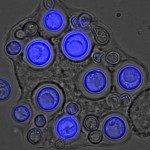Lien vers Pubmed [PMID] – 15917534
Antimicrob. Agents Chemother. 2005 Jun;49(6):2362-6
Immune reconstitution might not be the only factor contributing to the low prevalence of microsporidiosis in human immunodeficiency virus (HIV)-infected patients treated with protease inhibitors, as these drugs may exert a direct inhibitory effect against fungi and protozoa. In this study, we developed a cell culture-quantitative PCR assay to quantify Encephalitozoon intestinalis growth in U-373-MG human glioblastoma cells and used this assay to evaluate the activities of six HIV aspartyl protease inhibitors against E. intestinalis. A real-time quantitative PCR assay targeted the E. intestinalis small-subunit rRNA gene. HIV aspartyl protease inhibitors were tested over serial concentrations ranging from 0.2 to 10 mg/liter, with albendazole used as a control. Ritonavir, lopinavir, and saquinavir were able to inhibit E. intestinalis growth, with 50% inhibitory concentrations of 1.5, 2.2, and 4.6 mg/liter, respectively, whereas amprenavir, indinavir, and nelfinavir had no inhibitory effect. Pepstatin A, a reference aspartyl protease inhibitor, could also inhibit E. intestinalis growth, suggesting that HIV protease inhibitors may act through the inhibition of an E. intestinalis-encoded aspartyl protease. These results showed that some HIV protease inhibitors can inhibit E. intestinalis growth at concentrations that are achievable in vivo and that the real-time quantitative PCR assay that we used is a valuable tool for the in vitro assessment of the activities of drugs against E. intestinalis.
